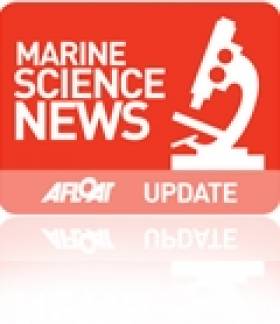Displaying items by tag: Forfas
Galway Atlantaquaria Nets Second Education and Outreach Award
Galway Atlantaquaria who, with the Marine Institute, Forfas Discover Primary Science and others are partners in the Explorers marine education and outreach programme, have achieved their second prestigious award - Best Education Project : Public and General Visitor 2010 - from the Britain and Ireland Association of Zoos and Aquaria (BIAZA) for their marine education and outreach activities.
The award, was presented at Paignton Zoo Environmental Park, Devon by Adrian Sanders MP and was given for the "Galway Marine Month of Madness" event, organised by the Atlantaquaria with help from the other Explorers partners during the month of May this year.
Speaking for the Atlantaquaria, Marketing Executive Colette Lavin said that the award was a tribute not only to the Atlantaquaria but to all those involved in the month-long celebration. "A lot of people put a lot of heart and hard work into the individual events that made up the Month of Marine Madness," she said. "And while this second BIAZA award is the most tangible benefit of all this, I really believe that the biggest reward for all our efforts is the raised awareness of the value of our oceans and seas, not only to Galway, but to the rest of the country."
The calendar of events was launched by Galway's Deputy Mayor Mr. Peter Keane at Salthill beach and events arranged during the Month of Marine Madness ranged from seashore safaris, diving lessons, scientific lectures, nature walks and angling demonstrations, to a series of free seminars at the Atlantaquaria on such subjects as Baleen Whales, Slimy
Seaweed, the value of outdoor education, and Pirates! The First Entrepreneurs. A highlight of the calendar was the 'Largest Beach Clean Up in Ireland' which took place on Sunday 18th of May. Over 2,000 members of the public took part in the various events which included a tour of the national research vessel RV Celtic Explorer by 280 pupils from local primary schools.
Speaking for the Explorers Programme, Dr. John Joyce of the Marine Institute said that the effort put in by Colette and her team had raised awareness of the sea to a whole new level in Galway during the month of May. "While Explorers is targeted primarily at raising awareness of the sea in schools, Colette and the Galway Atlantaquaria have shown us how we can raise that awareness to a whole new level by reaching out into the wider community. Last year, the Volvo Ocean Race vividly demonstrated the value of the sea to Galway in terms of tourism revenue. Clearly, the way is open to build on that awareness
and to use our creativity in finding new ways that Galway can profit - financially, educationally and environmentally – from marine related events."
Galway Atlantaquaria, the Marine Institute and the other partners in the Explorers programme celebrated the launch of National Science Week on Sunday 7th November with a Sunday Funday entitled "Our Plaice in Space" to celebrate the connections between outer and inner space.
Later in the month, on November 21st, the Explorers Programme will be present at the Galway Science and Technology Festival in NUI Galway.






























































